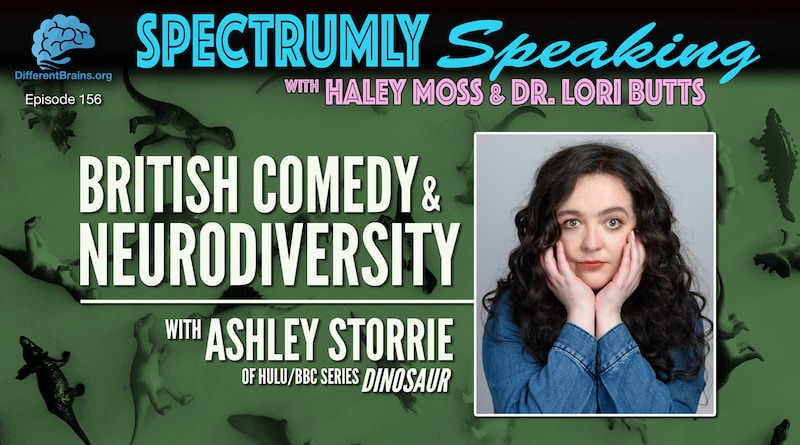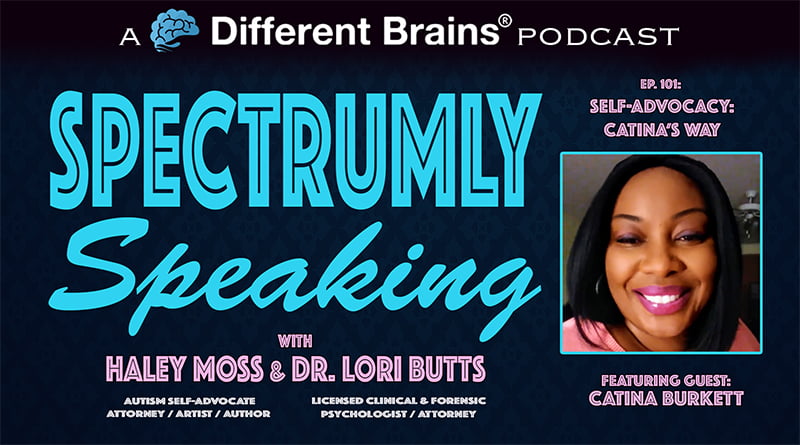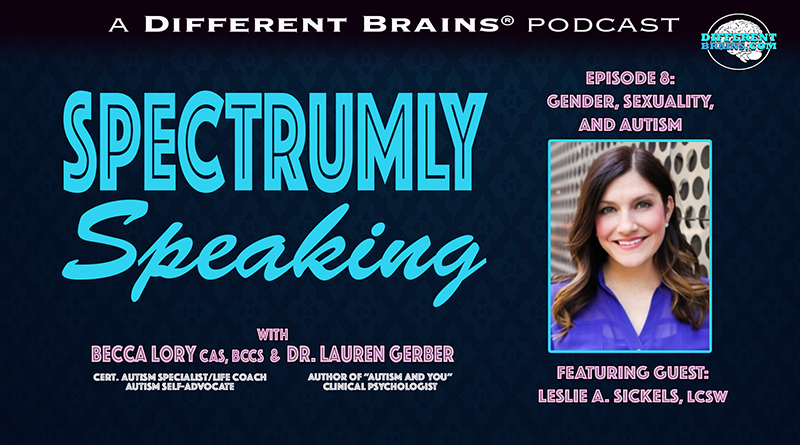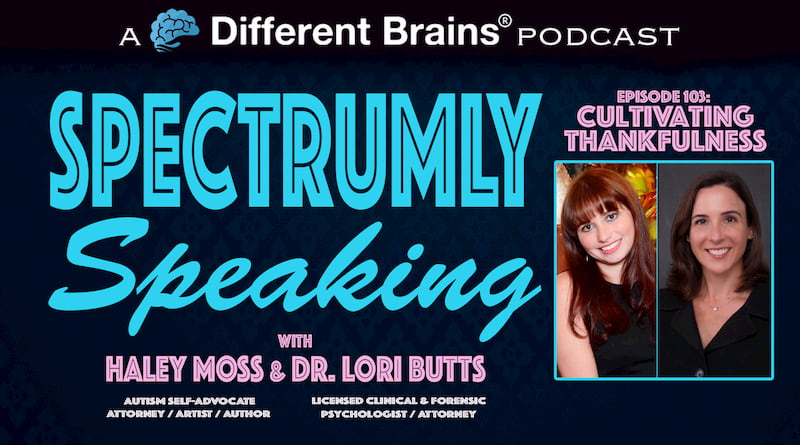
British Comedy & Neurodiversity, with Ashley Storrie | Spectrumly Speaking ep. 156
Spectrumly Speaking is also available on: Apple Podcasts | Stitcher | SoundCloud
IN THIS EPISODE:
In this episode, hosts Haley Moss and Dr. Lori Butts speak with Scottish autism self-advocate, comedian, writer, and actor Ashley Storrie. Ashley is the co-creator, co-writer, and star of the new show Dinosaur, which debuts this month (April 2024) in the US on Hulu, and on BBC One and BBC3 in the UK. Ashley can also be heard hosting her BBC Radio Scotland show live every Friday night, and co-hosting the new Midsomer Murders Podcast.
Read more about Dinosaur on the BBC here and on Hulu here.
Listen to Ashley’s BBC Radio Scotland show here.
Look for Ashley on Instagram here.
Photo of Ashley Storrie by Steve Ullathorne
Spectrumly Speaking is the podcast dedicated to women on the autism spectrum, produced by Different Brains®. Every other week, join our hosts Haley Moss (an autism self-advocate, attorney, artist, and author) and Dr. Lori Butts (a licensed clinical and forensic psychologist, and licensed attorney) as they discuss topics and news stories, share personal stories, and interview some of the most fascinating voices from the autism community.
For more about Haley, check out her website: haleymoss.net And look for her on Twitter: twitter.com/haleymossart For more about Dr. Butts, check out her website: cfiexperts.com
Have a question or story for us? E-mail us at SpectrumlySpeaking@gmail.com
CLICK HERE FOR PREVIOUS EPISODES
EPISODE TRANSCRIPTION:
Note: the following transcription was automatically generated. Some imperfections may exist.
HALEY MOSS (HM):
Hello, and welcome to Spectrumly Speaking. I’m Haley Moss, an author, artists attorney, and I’m autistic. As usual, I am very blessed to get to share the Spectrumly stage with my one and only co host…
DR LORI BUTTS (LB):
Hi, I’m Dr. Lori Butts. I’m an attorney and a psychologist.
HM:
How are you doing?
LB:
Great. How are you?
HM:
I feel like this is the week that just keeps on giving. Because I never know what day it is. I don’t know if you’ve ever had that feeling that suddenly it feels like time just moves a little too quickly. And you look over your shoulder and all of a sudden it’s almost the weekend, but it always feels like it’s Monday.
LB:
I get that. Yeah, absolutely.
HM:
And then you’re pleasantly surprised to realize it is not in fact, Monday and it has not been Groundhog Day, the entire week.
LB:
Right? You actually are coming closer to the weekend.
HM:
I know and somehow we’re getting closer to summer and vacation and other things that I am excited about. So I’m just in a good mode.
LB:
Good. We have a great guest today, I’m very excited.
HM:
We really do. So this is one of the episodes I will admit that I have been very much looking forward to recording because this is something that I’ve been hearing quite a bit about and someone that I am personally very, very excited to talk to. So today we are welcoming Ashley Storrie. Ashley is a comedian, writer and actor. She is the co-creator, co-writer and star of the new show Dinosaur, which debuts this month in the US on Hulu, and on BBC One and BBC Three in the UK. Ashley can also be heard hosting her BBC Radio Scotland show live every Friday night and CO hosting the new Midsomer Murders podcast. Welcome to the show.
ASHLEY STORRIE (AS):
Thank you, that was a very comprehensive introduction.
HM:
I am a big fan of efficiency when we can so I always appreciate when we get all the important points. So to help kick us off, and so our listeners can get as excited about you and dinosaur and all that you’re up to as well. Can you share with us how you became involved in the autism community?
AS:
Sure, um, when I was about 16, I was in a high school class, and we were studying psychology. And our teacher gave us something called the Baron Cohen test to read. And that was an old test for Asperger’s. It was a questionnaire interestingly created by the brother of Sacha Baron Cohen, aka Borat. And as I read this, I was like, for full context, my dad had been struggling with his mental health my whole life, and I was his primary carer because my mother worked away from home. And I was always kind of looking for solutions to my dad. And as I read this list of questions I have is like, Oh, my goodness, that’s my dad. That’s my dad. And I told him, I think you should go and speak to the doc. So a bit Asperger’s, and he did and he got diagnosed very quickly. And apparently, it was evident to all of the doctors who met him very quickly. And as soon as he kind of got diagnosed, I became very aware of autism and autism spectrum disorder, and then I got diagnosed quite a bit later.
LB:
Can you tell us a little bit about how you got into comedy and performing?
AS:
Sure I was raised in the entertainment industry? Well, no, that’s not true. I was a child actor when both of my parents worked in a bar, and were bartenders. And then my mother became a stand up comedian when I was about 11, or 10. And from that point forward, that kind of became my family business. It wasn’t the glamorous stand up comedy you see on television, it was, you know, traveling to small venues and festivals across the world. And Kenya, living a very frugal life while she told jokes and tried to make it as a female comedian from Scotland. So not exactly the best business plan, but that’s what she decided upon.
LB:
And so you would go around and travel with her to the to her to her while she worked.
AS:
Yep, that was what pretty much what I do. I’d go to the Edinburgh Festival in New Zealand Comedy Festival, Australia, Singapore, Canada, the US and Canada just be her like, personal assistant / bagman.
LB:
So you watched her perform, and you and you got interested in doing it yourself.
AS:
Yeah, I would watch her perform. I wasn’t necessarily interested in being a stand up comedian because a lot of people told me that’s what I should do. And I didn’t want to just share belligerents and defiance. And sometimes people tell me to do things and I just decided to do the opposite. And I don’t know why. But I just didn’t want to I just was very much backstage and the production side of comedy. So I know the ins and outs of the business from a production and management standpoint, way more than I understood it from a performance standpoint. And it wasn’t until I was in my mid 20s, that I thought, Oh, I’m going to just try stand up. And everybody was right. And it was very good and easy for me.
HM:
I think that’s the way to do it as you figure out that that’s something you want to do on your own terms, not because somebody says you’ll be good at it. So yeah, I’m so glad that you did get into comedy and performing. Since you now have this awesome show out called Dinosaur. Can you share with us? What dinosaur is about and how you got involved with this?
AS:
Dinosaur is a TV show about a lady called Nina who’s a paleontologist, and she lives with her sister, Evie, who she loves very much. And they have this very close codependent relationship upon each other. And Evie turns up out of the blue and says, I’m getting married to this man who I’ve only known for six weeks. That throws Nina’s whole life into a tailspin. Nina, like me is on the autism spectrum or has autism or as autistic. I never say the right thing. And I’m very nervous when I talk to other autistic people about it, because I’m scared I’m gonna get told off for seeing it the wrong way. But yeah, nobody’s gonna tell you if you’re okay, good. So yeah, that’s Nina. And that’s her life. And it’s kind of Nina navigating this world where she wants the world to be a very specific way. But as in how does she cope with that. And how does she navigate it. And how does she react to the people being irrational roundabout her.
LB:
What’s it like portraying and creating a character that’s autistic, like how much of your personal experiences and for Nina?
AS:
I would say Nina’s autism and my autism is probably the thing that we share the most in common because I wanted to tell Nina’s story, specifically the autistic part of her life, I wanted to tell it in a way that was very authentic. And the only way to tell it authentically is to use my own experience, I don’t think it would have been right to take other people’s experiences or things that I’ve maybe read about but didn’t feel because I wouldn’t be able to convey it properly either written or performatively. Because I don’t, it’s such a specific and, and special thing to each person that I I feel a little bit of done a disservice rather than raise awareness, it would have been more of a disservice to be an authentic with it. So Nina’s how she reacts to the world, and the things that would be categorized as autistic traits are the things that I’ve remained. So that’s where our similarities very much like.
HM:
I think that’s incredibly beautiful. And so often autistic characters aren’t portrayed by people who are autistic themselves, or have that lived experience or even the same traits. So I think that’s really special that you wanted to make Nina as authentic to you as possible. So for that, I am extremely grateful. And I hope that’s something that other folks feel that they can identify with and feel a kind of way about as well. So my question for you is, what do you hope that people take away from watching the show?
AS:
I guess my main hope is that people feel understood. It’s like that’s that that quote, that it’s lovely to be loved. But it’s profound to be understood. And I feel like when I grew up watching television, I love television, it’s my favorite genre of of anything. But when I grew up, there was nothing I watched that I thought there’s me, that’s who I am. And I remember my friends would watch Sex in the City when we were very young, far too young to be watching it, but they’d be like, Oh, I’m a carry and I’m a Samantha and I was never any of those women they never felt represented by any of those girls. So I guess my hope is that somebody can watch dinosaur don’t say, Oh, I’m a Nina. That would be the main dream.
HM:
I love that.
LB:
I do too. That’s so lovely. I love that
HM:
I didn’t personally start identifying with any of the Sex in the City girls until I was much older than that I don’t think any of them truly matched my entire life experience and like well I can tell you that this person in my life is a Charlotte and I can tell you that maybe I have a little bit of Miranda in me and a little bit and I but I want Karis closet. So I don’t know who I am. But I feel I can understand how other women feel this vibe. So I hope that I get that same experience you’re talking about because I also never really felt seen and I hope that I too can come away and go I think I’m a Nina better. So that’s a really cool feeling. And I and so we can watch the show on Hulu or BBC One or BBC Three. And how else can we keep in touch with you in the work that you’re doing? Because obviously you are the star here?
AS:
I am. I’m on Instagram. It’s probably the main social media player form that I use. It’s just my name Ashley story. I’m scared of Twitter so badly. I was on it for a long time. And I think it might be brain poisoned gaze. I’m not sure. But I think it might have made us all mad. And I came away from it. And I feel a lot better nowadays.
HM:
I don’t I don’t blame you. Honestly, I feel like Instagrams my favorite platform to spend time on as well.
AS:
I don’t know what to as I feel very protected on Instagram.
HM:
I do, too. I think it’s the lack of everybody sharing every single thought that they possibly have.
AS:
There’s a little bit more steps, there’s more steps to posting on Instagram. So it’s not just a one click process, there’s a couple of clicks. So you have to really want to post it.
HM:
Exactly. It requires a little bit of brainpower, right.
LB:
Right, extra clicks, decrease impulsivity.
HM:
And then that is making sure thinking, Are you sure you want to post this? Are you sure?
AS:
I’m glad I need somebody asking me those questions, because I don’t know how many posts my followers need to see of me crying on a train. So I think that I’m glad when the computer overlords say actually, is this really? Is this a good idea? And go no, no, it’s probably not because then they’ll start worrying. And then they found my mum. And then my mum gets phone calls from people on Facebook saying Ashley’s crying on a train again.
HM:
So then your mom starts following you on Instagram. And then she finds out that you’re crying in lifetime. And she’s like, Oh, no, that would mean, my parents would Instagram not too long ago. I don’t think they really know how to post on Instagram. But they realize that they’re starting to see reels every once in a while that may or may not have come from TikTok first. Yeah, like, look how cool we are. Like, I love you guys for this, but also more incentive not to post crying on a train, right?
AS:
Anecdotally, the worst ever interaction I had was I had got very upset about putting on weight. And I had gone on Facebook Live and cried, I need to stop going on lives. When I’m very close to my period. I don’t know why I keep doing it. But I do. And I’m crying and I’m like “my bum so fat, I got stuck in my chair” and I’m walking down the street, I hang up, I go to the gym, I come out the gym, I’m feeling better, almost as if that magically helped, which it did, because it’s endorphins and whatnot. And I’m feeling better. And I’m walking down the street. And this woman just drives past me with our window rolled down and she starts screaming out of our window, you should go on the ketogenic diet. And I thought she was just a random woman who had seen a fat person. And so I’m gonna give her advice. I didn’t realize that she had been somebody watching my Facebook Live, and had triangulated my location based off my surroundings to come and drive around, she’d been driving around my gym for an hour waiting for me to come out so that she could show you should go on a keto diet.
HM:
That’s kind of messed up.
AS:
It’s messed up. But also, I think, really funny.
LB:
It’s really funny.
HM:
it’s the way that you told that story that makes it even funnier, because sticking out my location for an hour, just to insult me, it’s a really great transition to what we wanted to talk to you about to is about what we should know, or what neurodivergent people should know, before even embarking on a career in comedy or performing because obviously, you have a fantastic sense of humor. And I think so many autistic people do have really great senses of humor. I know so many autistic people in my life who make me laugh for no good reason without having to resort to cheap sex jokes. And that, to me is a good sense of humor. So that makes me very excited that you didn’t have to say something crass and silly and immature in order to make me laugh today.
AS:
Really any other day I would have said something crass.
HM:
Humor, it’s just that I think your average bear just results to a cheap sex joke. And that’s their idea of being funny.
AS:
I think that are so — I guess American comedy so different from British comedy. But in British comedy, the amount of people I have met backstage who are stand ups who are fully neurodiverse it’s there’s a lot. So I think if you think oh, I’m not averse, and I enjoy writing jokes. You’re gonna go backstage and realize that you’re very much in the majority. And we are. We are a many layered people in the comedy community and the TV making community especially in the tech side of it. I know so many editors who are neurodiverse yeah, there’s a lot of buzz and because we’re all becoming more aware of it. Now. There’s people who maybe just thought they would a little bit different or a little bit particular hurricane of understanding their differences and being able to put a name on it and understand where that’s coming from and late diagnosed neurodivergent people.
LB:
So it sounds like you find community and, and so it’s easier when you have community to kind of keep working in the performing arena or the entertainment entertainment arena, at least that right?
AS:
Yes community but also been very open and honest from the get go. That was the thing about being Nina. Nina is unmasked and unabashed. And I had been a very mask to tastic person, and it was exhausting. And kind of getting that opportunity to be unmasked, unabashed, honest, be upfront with people and be able to vocalize that I don’t want to hug I’m not, I’m not being rude, I don’t enjoy being hugged. And instead of just taking it and then feeling ill for 15 minutes afterwards, but being able to vocalize that has been really good. And I’ve not come across many, just very few, sort of rich people within the entertainment industry, when I speak about these things. And I think that’s a testament to just the amount of people in our space and our community who have been speaking up before me, and who will continue after.
LB:
And so that’s the piece that enabled you to feel to be honest and to to unmask yourself. Is that what you’re saying?
AS:
Yeah, Dinosaur, like, yeah, made me feel like I could do that. And that I was still valuable and worthy, without kind of playing the version of Ashley that I played outside of the house for a really long time.
HM:
I think that’s awesome. And I just get excited here and this and I’m personally very, very excited to sit down and watch Dinosaur and see that version of Ashley, that’s not just even the version of Asher that we get to meet today too, and talking about it and just talking to you. And I think there’s something so cool when you get to sit down and watch something and you’re like, I got to talk to this person in real life. So I think that’s the only reason I didn’t admittedly, watch everything beforehand is like, I just want to talk to you in real life. And I’m like, I know her, Oh, my God, like I am a five year old about things like that. And I truly do appreciate your sense of humor and how you treat things and how you look at things. And thank you for giving us representation and really showing some of the nuances and so much of even just a little bit and I hope that our listeners come away with something exciting as well. As we mentioned before, you can check out Dinosaur on Hulu, if you are based in the US and if you are in the UK, it is on BBC One and BBC Three. As for the rest of us, be sure to check out diffbrains.org and check out their Twitter and Instagram @DiffBrains. And don’t forget to look for them on Facebook. If you’re looking for me, you can find me at Haleymoss.com or you can also say hello to me on the social media platform of your choice. Per today’s conversation. I believe that would be Instagram. So you can find me on Instagram at Haley dot moss. But if you really really feel inclined, I suppose you can go find me on the Twitter cesspool or on facebook or tick tock or whatever seems to speak to you.
LB:
I can be found at CFIexperts.com Please be sure to subscribe and rate us on Apple podcasts or your podcast app of choice. And don’t hesitate to send questions to spectrumlyspeaking@gmail.com. Let’s keep the conversation going.

Spectrumly Speaking is the podcast dedicated to women on the autism spectrum, produced by Different Brains®. Every other week, join our hosts Haley Moss (an autism self-advocate, attorney, artist, and author) and Dr. Lori Butts (a licensed clinical and forensic psychologist, and licensed attorney) as they discuss topics and news stories, share personal stories, and interview some of the most fascinating voices from the autism community.




